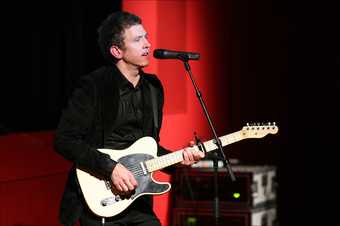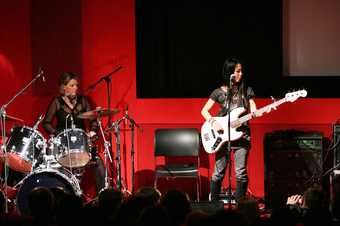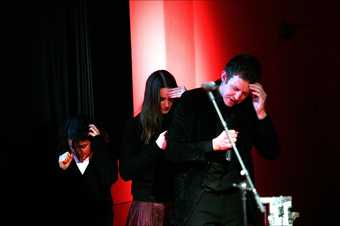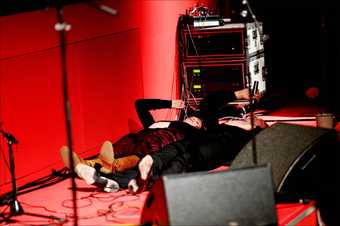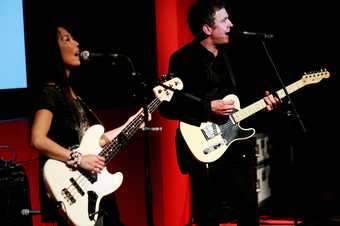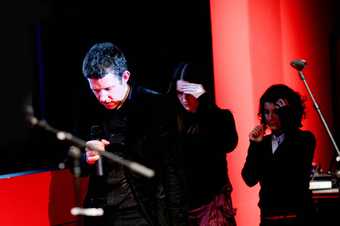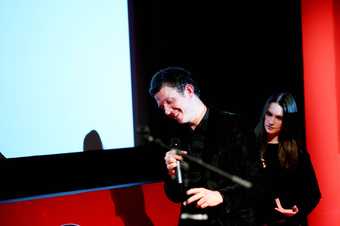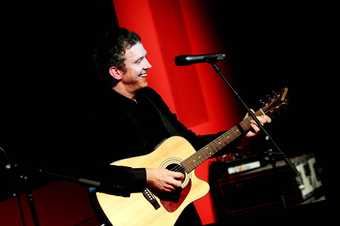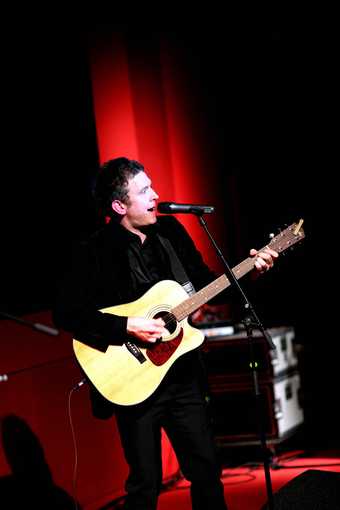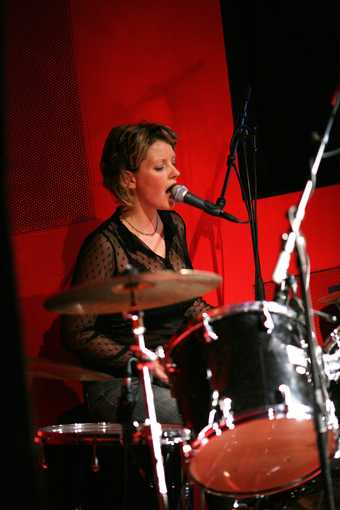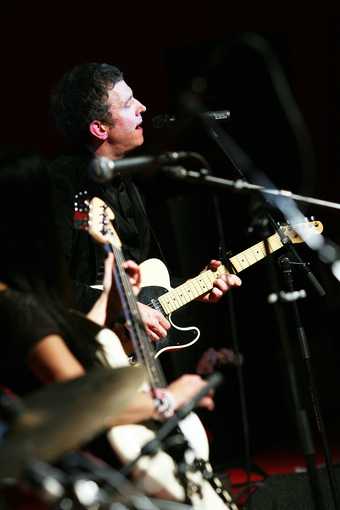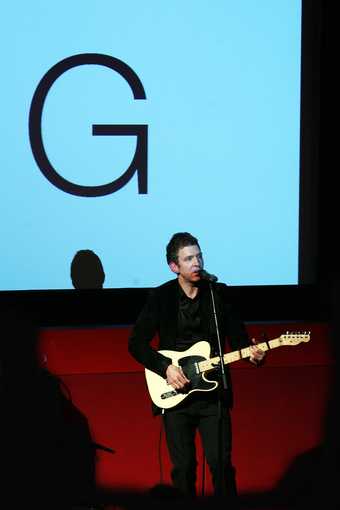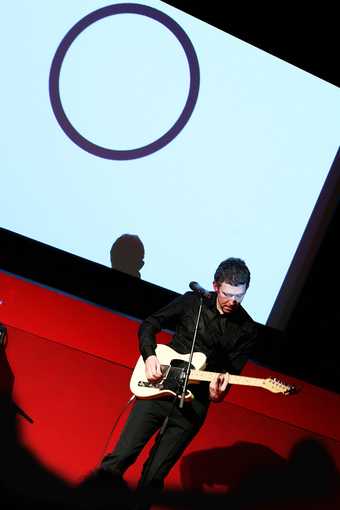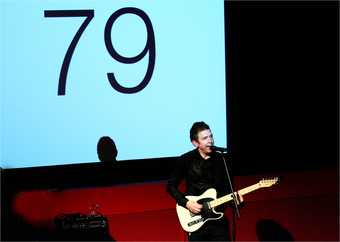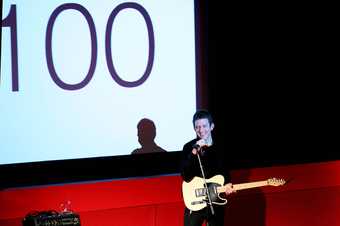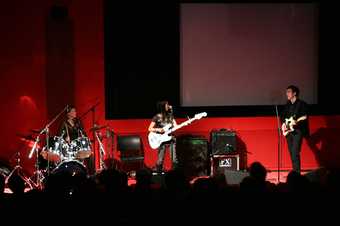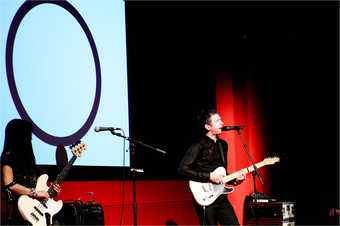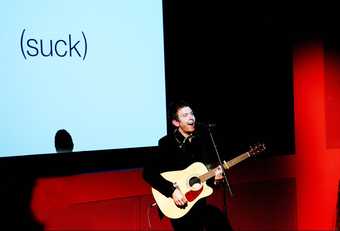On 25 June 2006, Martin Creed performed a new work, titled Words, to a live audience in Tate Modern’s Starr Auditorium, along with his bandmates and collaborators Karen Hutt, Keiko Owada, Jude Mannagh and Noriko Uno. Words was commissioned as part of UBS Openings: Saturday Live, a series of bi-monthly live performance events at Tate focusing on contemporary cultural practice. This edition of Saturday Live, subtitled Word Sculpture, focused on the use of language within contemporary art practice and also featured a text-based performance work, titled Visual Poetry, by Polish artist Ewa Partum and a poetry reading by American artist Carl Andre.
Words appropriated the formats of a music gig and an academic lecture, combining spoken word, written text, choreography and music. Both the composition and the performance of the work took place in the Starr Auditorium stage, lasting ninety minutes. In this time Creed and his band performed a series of speeches, songs, dances and actions from many different sources, which took words as their subject. Toward the beginning of the performance, with guitar in hand, Creed performed a comical punk-style meditation on the words ‘Fuck Off’, uttering them over and over again to the heavy beat of a drum kit. During a later song composed around the alphabet, the letters from A to Z were projected on a screen at the back of the stage as the band played a simplistic and repetitive tune and Creed sang the phonetic sound of each letter.
Rather than present language as a tool for expression, Words focused on the artist’s struggle to communicate. At one point Creed paced the stage muttering the words ‘I think that I have been … I think that mmm … I think that … I think that … I think that …’, all the while mimicked by two other performers who followed him back and forth, repeating his words and interrupting the artist each time he attempted to finish the sentence. This section demonstrated what Creed has discussed as his fraught desire to make an artwork in front of an audience using words, which could describe the fear and risk of failure that attends live communication and creation. In a film made following the performance, Creed commented that, ‘the best way to talk about work is to try to make a work right there in front of people and that’s what I was trying to do tonight … I love doing things in front of people but I don’t quite understand why … it’s out of control and a bit dangerous to me’.1 Indeed, as part of the performance itself, in between the choreographed events of stuttered and thwarted communication, Creed also expressed these fears, anxieties and desires directly to his audience, addressing them from the stage in what seemed to be intervals but which were part of the act. He confided: ‘I like standing up in front of people … it’s like bungee jumping, I think for me, you know, it’s like really slow bungee jumping.’ As such the work flowed between moments of insight into Creed’s desires for the work, the objectives of his practice as a whole and their public execution in the choreographed elements of the performance.
A former Turner Prize winner, Martin Creed is known for his diverse, playful and highly conceptual sculptural, installation and performance works, which often test the limits of the mediums and formats they employ. Words, both performed and written, have long been an integral part of Creed’s practice. In his work text is often both the medium and a route to engage conceptually with the nature of language and its use in artistic practice. Speaking about his engagement with words in his 2005 essay-artwork, If you’re lonely… (Work #470), Creed said: ‘Talking about work is work. Thinking is work. Words are work. Words are things, shapes.’ These concepts were once again addressed and expanded upon within the live performance of Words at Tate the following year, which Creed positioned as ‘a talk about trying to talk’.
All three of the artists included in the Word Sculpture events have treated words as a sculptural material. Partum scattered words like confetti, Andre arranged them on pages in formal patterns and Creed generated them through numerical sequences. By juxtaposing the different approaches to word sculpture, the Saturday Live programme considered language as a material for making. At the same time, in each case, there was a productive and irresolvable tension between the presentation of words as a visual or aural artefact and their attached meaning.
Clare Gormley
May 2016

